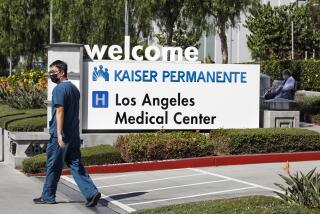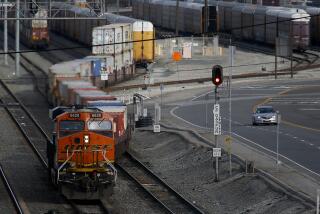Kaiser Gets Tentative OK to Expand Operation
- Share via
Over the objections of air quality engineers, a hearing board has tentatively agreed to permit Kaiser International of San Pedro to handle a wide variety of commodities in addition to coal--among them copper concentrate, wood chips and fertilizer.
If the agreement becomes final, it will be the second time in three months that the hearing board of the South Coast Air Quality Management District has turned down the recommendations of district staff to rule in favor of Kaiser, which is the largest exporter of coal and petroleum coke at the Port of Los Angeles.
In late October, the hearing board--which is appointed by the AQMD governing board to adjudicate differences between the district and regulated industries--granted two crucial operating permits to Kaiser, despite the staff’s assertion that the company’s coal exporting operation created a public nuisance. Boaters had also complained that the company’s bulk loader--the equipment it uses to load coal and petroleum coke on ships bound for South Korea--pollutes the air and spews black dust on their pleasure craft.
The most recent AQMD action came Tuesday during a hearing to set conditions on the permits granted in October. The hearing is not finished and will continue Monday at 9:30 a.m. at the district offices in El Monte, 9150 Flair Drive.
The conditions agreed to Tuesday specifically permit Kaiser to handle eight commodities--among them coal, petroleum coke, iron ore, copper concentrate and iron ore concentrate--at its Miner Street facility.
However, the board also agreed that Kaiser could handle whatever else it wanted, provided the company gives air quality officials 30 days notice, and that the material can be hosed with water to minimize dust-particle pollution in the air.
That kind of open-ended arrangement contradicts standard AQMD procedure, said district lawyer Elliott Sernel. The district generally requires a company to prove that whatever it is handling will not create pollution, Sernel said. That is usually done, he said, by granting temporary permits and monitoring a company’s operations as a way of determining whether final approval is warranted.
Sernel was not pleased with the board’s action. “Our position is if and when there are problems, which we feel there will be, the board itself is going to be responsible,” he said.
The board also tentatively agreed to limit the volume of material Kaiser can handle to 72,000 tons a day, more than the 48,000 tons recommended by the staff but less than the unlimited amount Kaiser wanted. In addition, the board agreed to limit to 10 m.p.h. the speed of trucks going to the Kaiser facility, although the AQMD staff had recommended a 5 m.p.h. speed limit.
Steven Broiles, a lawyer for Kaiser, said he was pleased with the outcome of Tuesday’s hearing, although he said the agreement is not final and the board could still change its mind.
More to Read
Inside the business of entertainment
The Wide Shot brings you news, analysis and insights on everything from streaming wars to production — and what it all means for the future.
You may occasionally receive promotional content from the Los Angeles Times.










